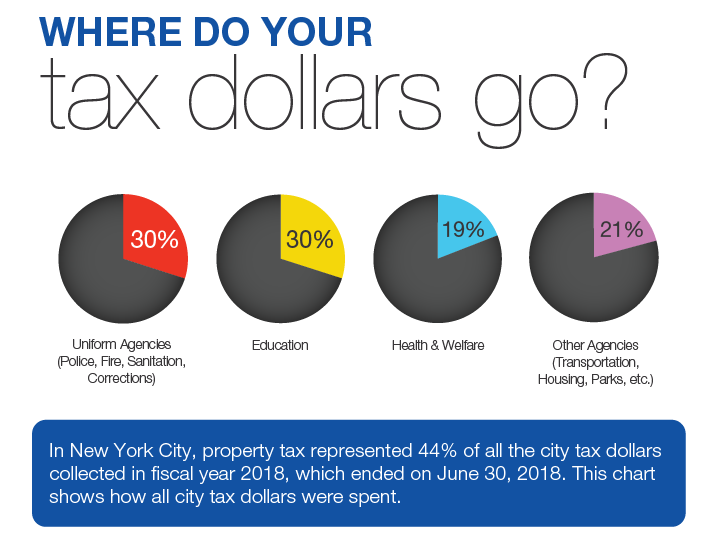
Before You Sign in NYC
Understand Real Estate Tax Liabilities
Why its important to understand a building’s tax situation when leasing office space.
Most office leases in Manhattan are gross leases meaning that taxes and insurance are included in the base rent and that the landlord will pass through certain increases in building costs. One of those pass through increases are the increase in real estate taxes for their property. Typically, you’d see a provision in a term sheet that states:“Tenant shall pay its proportionate share in Real Estate Taxes for the Building over a Base Year of 2019/2020.”Before we dissect what this means, let’s understand how property taxes in NYC are calculated.
Real Estate Tax Calculation
Real Estate taxes are calculated using a complex formula that takes many amounts and calculations into account. Essentially the Department of Finance calculates a property’s market value (using the building’s income and a market capitalization rate), establishes an assessed value (as a set percentage of the market value), subtracts exemptions, and multiplies that by the current tax rate. With market value directly correlated to a building’s net income, as the income of a property rises, it’s tax bill would increase as well. Real Estate Taxes are typically billed 2 times per year and due on July 1st and January 1st of each year. So tenants receive a tax reconciliation bill two times each year.
How does a pass through work
Assume that a 100,000 rentable square foot (RSF) building is being charged $1,000,000 in city taxes in 2019/2020. If a 10,000 SF tenant, whose proportionate share of the building is 10%, negotiates a Base Year of 2019/2020 then their Base Year amount is $10.00/ RSF. If taxes increase by 3% in 2020/2021 to $1,003,000 ($10.30/ RSF) then the tenant would be responsible to pay for the $0.30/ RSF difference between the current year and Base Year’s taxes. What most tenants don’t realize is that there are many circumstances that could cause a sudden spike in Real Estate taxes that they would unwittingly have to pay for.Potential Pitfalls
Exegerated Tax Bill
An example of this is a 400,000+ RSF Class A property in the heart of Times Square with significant lucrative signage on the building façade and very valuable retail in the base. A tenant signing a lease in the building could simply negotiate a base year and expose themselves big surprises in the coming years. If they’d have done some research, they’d have learned that because of the additional revenue from the signage and retail the building’s tax bill is more than double that of similar competitive class buildings. This means that if taxes increase by 3% per annum then their share of the increase will be double that of other properties. Ex. A base year of $15.00/ RSF increased at 3% is $15.45/ RSF exposing the tenant to a $0.45/ RSF pass through expense. A base year of $30.00/ RSF increased at 3% is $30.90/ RSF exposing the tenant to a $0.90/ RSF real estate tax pass through expense. This would equate to approximately $220,000 additional expense over a 10 year lease term.Increased NOI
The building recently signed a lucrative lease for a significant portion of the building’s exterior signage. This will increase the NOI resulting in another unexpected increase to the building’s taxes that will be passed through to tenants.

Building Improvements
The building constructed a beautiful new Class A lobby and moved its lobby from Broadway portion to the side street to create more valuable Broadway retail space. This will likely have a two pronged impact to the building’s Net Operating Income (NOI). First, the building will undoubtedly see a spike in office rents due to the renovation of the lobby and second ownership created a significant amount of prime Broadway retail space. Any tenant with an older base year will have to bear the brunt of a significant tax increase resulting from the additional NOI.
Assessment Value
Additionally, the building is currently being assessed by the city at a Transitional Assessed Value which is 15% below its Actual Assessed Value. The Transitional Assessed Value utilizes a formula to phase in taxes over a period of 5 years so that buildings will not be hit with a sudden hike in real estate taxes. Once this 5 year period is over the building will be assessed at its Actual Assessed Value resulting in an additional 15% increase to the building’s taxes that tenants who’ve signed leases within the past 5 years would have to absorb. SOURCE Spaces Commercial Real Estate is a commercial real estate brokerage firm that helps businesses develop a space search strategy, find the right office space, and negotiates the most favorable lease terms. We audit each and every space option to ensure that the physical aspects of the building and space meet our clients needs today and into the future. Additionally, we look beyond the base rent, free rent, and improvement allowance to ensure our clients are protected from more of the predatory clauses in office leases.To learn more about this and other ways to protect your company from hidden and unexpected leasing costs reach out to us using the form below:
Jack Cohen
Jack Cohen has over 22 years of industry experience developing and implementing real estate strategies for clients in Manhattan and throughout the United States. Prior to founding Spaces Commercial Real Estate, Jack was a Managing Director at Colliers International for 3 years and a Director at Cushman & Wakefield for 9 years. Jack’s forward thinking has engineered some of Manhattan’s most unique and difficult deals including the repositioning and leasing of 636 11th Avenue, a 564,000 RSF warehouse to office conversion, which was awarded real estates highest honor- REBNY’s Henry Hart Rice Most Ingenious Deal of the Year Award. Jack is a graduate of Rutgers University School of Business where he majored in Economics and Business Management. He is a member of the Real Estate Board of New York, the executive committee of American Israel Public Affairs Committee (AIPAC), and the Board of Education of Keter Torah, his childrens’ school. Jack lives on the Jersey Shore with his wife and three children.
